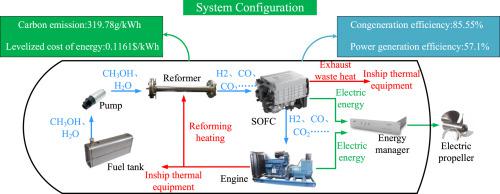当前位置:
X-MOL 学术
›
Renew. Sust. Energ. Rev.
›
论文详情
Our official English website, www.x-mol.net, welcomes your
feedback! (Note: you will need to create a separate account there.)
Integrated analysis and performance optimization of fuel cell engine cogeneration system with methanol for marine application
Renewable and Sustainable Energy Reviews ( IF 16.3 ) Pub Date : 2024-05-14 , DOI: 10.1016/j.rser.2024.114564 Chengjie Li , Zixuan Wang , He Liu , Fafu Guo , Chenghao Li , Xinyan Xiu , Cong Wang , Jiang Qin , Liqiu Wei
Renewable and Sustainable Energy Reviews ( IF 16.3 ) Pub Date : 2024-05-14 , DOI: 10.1016/j.rser.2024.114564 Chengjie Li , Zixuan Wang , He Liu , Fafu Guo , Chenghao Li , Xinyan Xiu , Cong Wang , Jiang Qin , Liqiu Wei

|
To achieve environmental sustainability and low carbon emissions in the field of marine power systems, it is crucial to enhance system performance in both the fuel subsystem and power subsystem. This study introduces a solid oxide fuel cell (SOFC) engine cogeneration system utilizing methanol fuel designed specifically for marine applications. Methanol serves as a hydrogen source for the SOFC through online reforming, producing hydrogen. The engine further enhances energy efficiency by utilizing the anode tail gas from the SOFC. The study employs the energy, economy, and environment (3E) analysis method to assess the system's performance. Results demonstrate that the system exhibits high energy efficiency and low carbon emissions. The system configuration is optimized, and design points are determined through parameter optimization. The rated power generation efficiency of the system can reach 59.57 %, which is nearly 20 % absolute efficiency improvement compared to methanol engines. An analysis of the system's performance under partial load conditions reveals that, even at 53 % load, the power generation efficiency remains at 53.29 %. The total life cycle carbon emissions for the system is 319.78 g/kWh, significantly lower than the engine. The levelized cost of energy for the system are 0.1161 $/kWh, slightly higher than engine power generation costs.
中文翻译:

船用燃料电池发动机甲醇热电联产系统综合分析与性能优化
为了实现船舶动力系统领域的环境可持续性和低碳排放,提高燃料子系统和动力子系统的系统性能至关重要。本研究介绍了一种专为船舶应用而设计的采用甲醇燃料的固体氧化物燃料电池 (SOFC) 发动机热电联产系统。甲醇作为SOFC的氢源,通过在线重整生产氢气。该发动机利用 SOFC 的阳极尾气进一步提高了能源效率。该研究采用能源、经济和环境(3E)分析方法来评估系统的性能。结果表明,该系统表现出高能源效率和低碳排放。对系统配置进行优化,通过参数优化确定设计点。系统额定发电效率可达59.57%,相比甲醇发动机绝对效率提升近20%。部分负载条件下系统性能分析表明,即使在53%负载下,发电效率仍保持在53.29%。该系统的总生命周期碳排放量为319.78克/千瓦时,显着低于发动机。该系统的平准化能源成本为 0.1161 美元/kWh,略高于发动机发电成本。
更新日期:2024-05-14
中文翻译:

船用燃料电池发动机甲醇热电联产系统综合分析与性能优化
为了实现船舶动力系统领域的环境可持续性和低碳排放,提高燃料子系统和动力子系统的系统性能至关重要。本研究介绍了一种专为船舶应用而设计的采用甲醇燃料的固体氧化物燃料电池 (SOFC) 发动机热电联产系统。甲醇作为SOFC的氢源,通过在线重整生产氢气。该发动机利用 SOFC 的阳极尾气进一步提高了能源效率。该研究采用能源、经济和环境(3E)分析方法来评估系统的性能。结果表明,该系统表现出高能源效率和低碳排放。对系统配置进行优化,通过参数优化确定设计点。系统额定发电效率可达59.57%,相比甲醇发动机绝对效率提升近20%。部分负载条件下系统性能分析表明,即使在53%负载下,发电效率仍保持在53.29%。该系统的总生命周期碳排放量为319.78克/千瓦时,显着低于发动机。该系统的平准化能源成本为 0.1161 美元/kWh,略高于发动机发电成本。

































 京公网安备 11010802027423号
京公网安备 11010802027423号